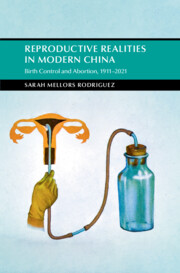Book contents
- Reproductive Realities in Modern China
- Cambridge Studies in the History of the People’s Republic of China
- Reproductive Realities in Modern China
- Copyright page
- Contents
- Figures
- Tables
- Acknowledgments
- Note on the Text
- Introduction
- 1 Building a Fitter Nation: Eugenics, Birth Control, and Abortion in Public Discourse, 1911–1949
- 2 Birth Control in Practice
- 3 Reaping the Fruits of Women’s Labor: Birth Control in the Early PRC, 1949–1958
- 4 “Birth Planning Has Many Benefits”: Weaving Family Planning into the Fabric of Everyday Life, 1959–1965
- 5 Controlling Sex and Reproduction across the Urban–Rural Divide, 1966–1979
- 6 The Rise and Demise of the One Child Policy, 1979–2015
- Epilogue: Birth Control and Abortion in the Longue Durée, 1911–2021
- Appendix: Interviews
- Glossary
- References
- Index
Introduction
Published online by Cambridge University Press: 19 January 2023
- Reproductive Realities in Modern China
- Cambridge Studies in the History of the People’s Republic of China
- Reproductive Realities in Modern China
- Copyright page
- Contents
- Figures
- Tables
- Acknowledgments
- Note on the Text
- Introduction
- 1 Building a Fitter Nation: Eugenics, Birth Control, and Abortion in Public Discourse, 1911–1949
- 2 Birth Control in Practice
- 3 Reaping the Fruits of Women’s Labor: Birth Control in the Early PRC, 1949–1958
- 4 “Birth Planning Has Many Benefits”: Weaving Family Planning into the Fabric of Everyday Life, 1959–1965
- 5 Controlling Sex and Reproduction across the Urban–Rural Divide, 1966–1979
- 6 The Rise and Demise of the One Child Policy, 1979–2015
- Epilogue: Birth Control and Abortion in the Longue Durée, 1911–2021
- Appendix: Interviews
- Glossary
- References
- Index
Summary
Li Xiaoping was a credit officer at a small bank branch and a married woman. One day in 1956, Chen Xu, the director of a nearby military camp, visited the bank. Soon after meeting, the two began having an affair. However, when Chen professed his love to Li and asked her to leave her husband for him, she refused. Not long after, Li realized she was pregnant and that Chen was the father. Knowing that adultery was punishable by law and an out-of-wedlock pregnancy provided the most indicting evidence of infidelity, Li decided to abort the fetus using a method she had heard about that involved consuming quinine tablets. Today quinine is used to treat malaria, but for much of the twentieth century taking an overdose to deliberately terminate a pregnancy was relatively common in China and other parts of the world.1 Though not technically banned at the national level, local authorities frequently charged and convicted people who underwent, performed, or facilitated home abortions.2 Knowing this, Li had to convince her doctor to prescribe quinine for another illness. In the end, she successfully aborted the pregnancy, and the affair was not discovered for another two years.3
- Type
- Chapter
- Information
- Reproductive Realities in Modern ChinaBirth Control and Abortion, 1911–2021, pp. 1 - 17Publisher: Cambridge University PressPrint publication year: 2023



